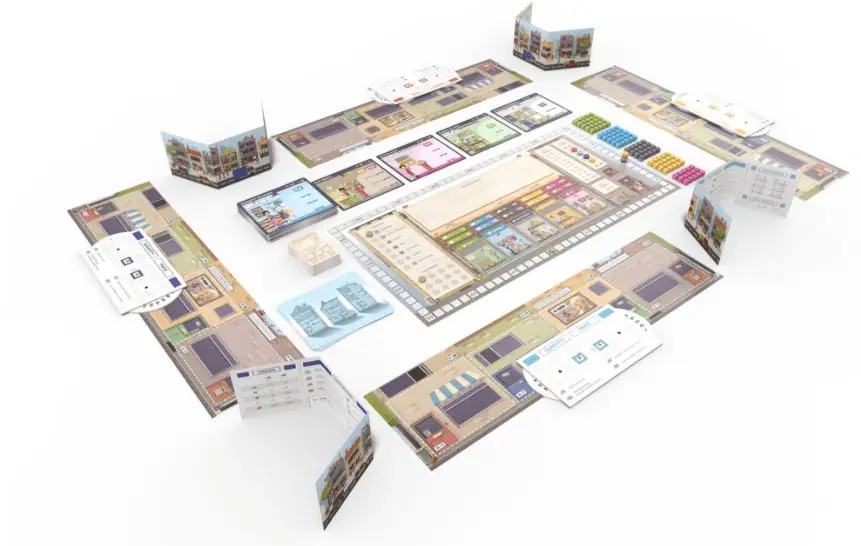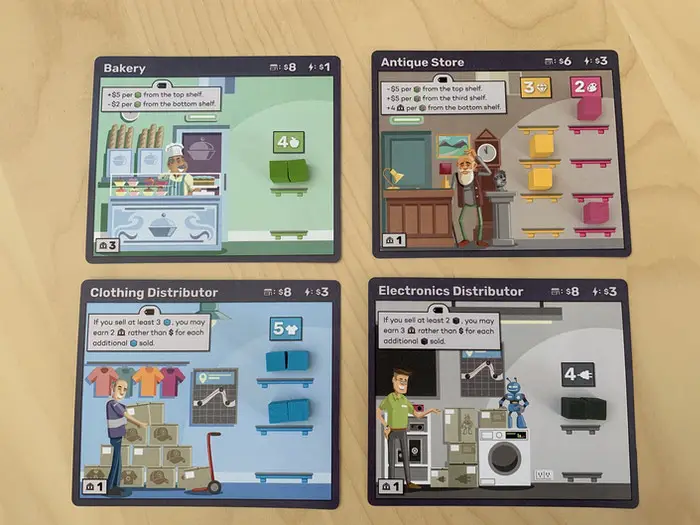Most of the games that I’ve reviewed recently have been family oriented without too much overt competition. Brick and Mortar from designer Nicholas J. McCollum and artist Tristam Rassin from Octoraffe Games, is the exact opposite of that.
An economic game of narrow margins, quirky stores, and strategic market manipulation, this game is perfect for the true competitors among us. The Fandomentals received an early prototype of the game for a fair review so the pictures below are from the Kickstarter updates, but we can tell you that the prototype itself was high quality! Always a good sign.
What’s in the box?
Though the final box will change slightly based on the final stretch goals, the current components list includes a game board, 4 each of player boards, bidding dials, player screens, player point markers, and player turn markers. The game also includes 65 unique store cards, 6 starting store cards, 84 market cards, 105 colorful resource cubes, 1 each of the phase, round, and game-end markers, money, debt tokens, and an incredibly detailed and helpful (draft) rulebook.

In the prototype and from update photos on Kickstarter, the game pieces are all of great quality and super importantly, have strong contrast making pieces easy to read and shuffle through quickly.
How’s it play?
Two to four players assume the role of enterprising store owners who expand their reach into a variety of markets. Over multiple rounds, you’ll try to maximize profits, build equity, and undercut you competition—all while dealing with a market that can change at the whim of your opponents.
Each round, players simultaneously determine the market, speculate on resources, sell what they can, invest in victory points, and manage your storefronts. Each new store in a player’s building provides unique benefits and restrictions. In the end, the player with the greatest investment in both stores and points wins!

Since there’s so many store types, there truly is options for every type of game player. You can manipulate markets for food, clothing, electronics, jewelry, art, etc. Each store or option comes with thematic bonuses and twists. For example, with a bakery you can charge a premium for fresh bread, but the longer you’ve got the bread, the worse your profit margin. Similarly, items from the thrift store don’t sell for much but you get major points for donating to other stores.
Adding to the fun is that you can undercut your competitors, by bidding to buy and sell goods! But, the kicker is that what you bid is binding, so if you don’t sell before the demand cards fill up, you’ve lost those goods.
Plus each round you play cards that determine which goods are even available to stock and how many of each you can sell. Sounds easy enough, except all the market cards are pooled together, so cards you play can help the other players and vice versa. Finally, like a real business you’ll pay utility costs and make decisions about inventory.
The first game took about two hours to get situated and to understand the rules, but seasoned players will likely play for an hour to 90 minutes.
The verdict?
Brick and Mortar can seem intimidating when you open the box, but once the players go through the first few rounds it becomes simple to play despite its complexities. The game isn’t hard to understand per se, but there’s a lot of different elements that you have to learn all at the beginning, and it can be overwhelming at first. Luckily, the rulebook is very straightforward, and there’s even a preset “First Game” scenario that’s given so that first time players can get a grasp on the mechanics and strategy of the game.
The different phases of each round make it easy to learn about all of the different tasks and risks in the game fairly quickly. The playing order also adds a bit of risk to the game; the person who holds the most Victory Points in each round will go first, but that gives their competitors a chance to see what they’re doing and strategize against them, which evens out the balance of the game quite nicely.
Balance itself is sort of an overarching theme in the game. The time factor of the game means that certain resources will expire, devalue, or increase in value after a certain number of turns, and it’s important to keep a careful eye on the inventory of your stores if you want to be able to make the most money possible.
Overall, Brick and Mortar is a very enjoyable game once players get past the first couple of rounds. The visuals are wonderful as well, and they only add to the experience that the game provides. Anyone who likes economy based games — tabletop or otherwise — will definitely enjoy this.
You can order Brick and Mortar as a late pledge from Game Found for $64, a solid value for how much is packed into just one box. You can also try the game out on TableTopia before ordering.
Images courtesy of Octoraffe Games
[rwp_box id=”0″]
Have strong thoughts about this piece you need to share? Or maybe there’s something else on your mind you’re wanting to talk about with fellow Fandomentals? Head on over to our Community server to join in the conversation!

